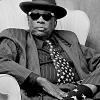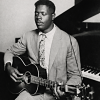Home » Jazz Musicians » Son House
Son House
Son House, the legendary Delta blues singer and guitarist, was an original voice coming out of Depression era Mississippi. He embodied the isolation, poverty and alienation of the Delta, which translated into his visceral and gripping expressions, forming the bedrock of the blues idiom. His influence looms large in the annals of American popular music.
House was born on the Mississippi River Delta, on a plantation between the towns of Lyon and Clarksdale. The Delta, formed by the Big Muddy's deposits of silt, is a flat belt of fertile land that has been used for farming since the eighteenth century. Before the Civil War and the abolition of slavery, in 1865, Delta plantation owners had been major purchasers of human labor. After they received their freedom, the displaced former slaves maintained their musical and storytelling traditions, spirituality, endurance, and humor—all of which found a voice through the blues.
Still, the music that emerged from these common beginnings was not embraced by all blacks; the Delta blues belonged to the poorest and most illiterate. It grew to sophistication on street corners and in the rowdy and often dangerous drinking places called juke joints. The performers were usually drifters who could find work anywhere during harvest time. But the most popular became local stars—and often infamous. In Deep Blues, blues scholar Robert Palmer explained: "Blues was so disreputable that even its staunchest devotees frequently found it prudent to disown it. The church and the blues were not supposed to mix. This was an ethical dilemma that haunted Son House all of his life.
By the age of 15 House was giving sermons. By 20, he was the pastor of a Baptist church near Lyon. And though he was passionate about religion, House never committed to a career in the church. He rambled from job to job, picking cotton, gathering tree moss, always looking for the least strain. Though his father, Eddie House, Sr., and his uncles had their own horn band, Son House never viewed music as a professional option.
By 1926, after a romance had taken him to Louisiana, House had returned to Lyon and was considering going back to the church. Around that time, while doing some rambling and drinking, House had seen a local bluesman named Willie Wilson play bottleneck guitar. He was dazzled. "This boy," House remembered in Guitar Player, "had a thing on his finger like a small medicine bottle, and he was zinging it, you know." He recalled, "'Sounds good!' I said. 'Jesus, I like that! I believe I want to play one of them things.'" With a dollar and a half House went out and bought himself a battered guitar. Wilson taught him how to tune by ear, another player, James McCoy, gave him lessons, and the rest he picked up on his own.
Read moreTags
Son House and Reverend Gary Davis: The Perpetual Appeal Of The Blues

by Doug Collette
Perfectly complementary in their earthy simplicity, the archive titles by Son House and Reverend Gary Davis offer an antidote to the antiseptic ephemera that is contemporary pop. None other than Dan Auerbach of the Black Keys curated the former's Forever On My Mind (and released it on his own Easy Eye Sound label) while the latter's Let Us Get Together, comprised of two concert recordings via the Sunset Blvd. Records, provides charitable support to the blind (like the artist himself) ...
Continue ReadingDaniel Beaumont: Preachin’ the Blues - The Life and Times of Son House

by C. Michael Bailey
Preachin' the Blues: The Life and Times of Son House Daniel Beaumont Hardback; 224 pages ISBN: 0195395573 Oxford University Press 2011 Some of the new millennial writing about blues music, such as Elijah Wald's Escaping the Delta: Robert Johnson and the Invention of the Blues (Amistad, 2004) and Ted Gioia's Delta Blues (Norton, 2008), devote a great deal of energy addressing how the blues- scholarship approach of the 1950s and 1960s ...
Continue ReadingSon House: Delta Blues: The Original Library of Congress Sessions from Field Recordings, 1941-42

by AAJ Staff
The ‘Sixties folk boom brought a lot of surprises – while new performers grew famous, old figures (bluesmen, etc.) were “rediscovered" and returned to the stage. The biggest surprise was Son House, in 1964 – it was actually the third time he’d been rediscovered! First recorded in 1930, House found music a hard life and became a laborer; Alan Lomax found him in Mississippi and recorded five titles. Lomax returned the following year ; this time Son is alone and ...
Continue ReadingSon House: The Original Library of Congress Sessions From Field Recordings 1941-1942

by Ed Kopp
These Son House “field recordings" were made in 1941 and ‘42 by folklorist Alan Lomax, who toured the country with a crude 300-pound machine documenting all sorts of regional music.In the 1930s, Son House served as the main inspiration to fellow Mississippians Robert Johnson and Muddy Waters, arguably the two greatest innovators the blues has known. House hadn’t recorded in 11 years when Lomax him tracked down in Robinsonville, Mississippi. The Depression had forced the slide guitarist and ...
Continue ReadingJazz Musician of the Day: Son House

Source:
Michael Ricci
All About Jazz is celebrating Son House's birthday today!
Son House, the legendary Delta blues singer and guitarist, was an original voice coming out of Depression era Mississippi. He embodied the isolation, poverty and alienation of the Delta, which translated into his visceral and gripping expressions, forming the bedrock of the blues idiom. His influence looms large in the annals of American popular music. House was born on the Mississippi River Delta... Read more.
Place our Musician of the Day ...
read more
Jazz Musician of the Day: Son House

Source:
Michael Ricci
All About Jazz is celebrating Son House's birthday today!
Son House, the legendary Delta blues singer and guitarist, was an original voice coming out of Depression era Mississippi. He embodied the isolation, poverty and alienation of the Delta, which translated into his visceral and gripping expressions, forming the bedrock of the blues idiom. His influence looms large in the annals of American popular music. House was born on the Mississippi River Delta... Read more.
Place our Musician of the Day ...
read more
Son House Bio, Preachin the Blues: The Life and Music of Son House

Source:
Just Roots PR
Guitarist/vocalist Son House was a powerful, impassioned performer and a pivotal figure in Delta Blues.
University of Rochester professor Dan Beaumont has announced his forthcoming book, Preachin’ the Blues: The Life And Music Of Son House.
This is the first full-length biography of Son House, and will be published by Oxford University Press in 2010.
About Son House Son House was born approximately March 21, 1902 in Riverton, Mississippi. House’s life was one of “dramatic reversals.” Whereas a ...
read more
































